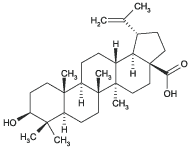Antitumor and anti-HIV agent. Induces apoptosis by activating mitochondrial permeability transition (MPT). Inhibits NF-κB activation and NF-κB-regulated gene expression induced by carcinogens and inflammatory stimuli. Decreases expression of Bcl-2 and cyclin D1. Potent proteasome activator.
Product Details
| Alternative Name: | 3β-Hydroxy-20(29)-lupaene-28-oic acid |
| |
| Formula: | C30H48O3 |
| |
| MW: | 456.7 |
| |
| Source: | Isolated from Platanus acerifolia (plane tree) bark. |
| |
| CAS: | 472-15-1 |
| |
| Purity: | ≥90% (HPLC) |
| |
| Appearance: | White to off-white powder. |
| |
| Solubility: | Soluble in DMSO. |
| |
| Shipping: | Ambient Temperature |
| |
| Long Term Storage: | +4°C |
| |
| Regulatory Status: | RUO - Research Use Only |
| |
Please mouse over
Product Literature References
Activation and inhibition of the proteasome by betulinic acid and its derivatives: L. Huang, et al.; FEBS Lett.
581, 4955 (2007),
Abstract;
Betulinic acid decreases expression of bcl-2 and cyclin D1, inhibits proliferation, migration and induces apoptosis in cancer cells: W. Rzeski, et al.; Naunyn Schmiedebergs Arch. Pharmacol.
374, 11 (2006),
Abstract;
Betulinic acid and its derivatives: a review on their biological properties: P. Yogeeswari & D. Sriram; Curr. Med. Chem.
12, 657 (2005), Review,
Abstract;
Betulinic acid-induced apoptosis in leukemia cells: H. Ehrhardt, et al.; Leukemia
18, 1406 (2004),
Abstract;
Chemistry, biological activity, and chemotherapeutic potential of betulinic acid for the prevention and treatment of cancer and HIV infection: R.H. Cichewicz & S.A. Kouzi; Med. Res. Rev.
24, 90 (2004), Review,
Abstract;
Betulinic acid suppresses carcinogen-induced NF-kappa B activation through inhibition of I kappa B alpha kinase and p65 phosphorylation: abrogation of cyclooxygenase-2 and matrix metalloprotease-9: Y. Takada & B.B. Aggarwal; J. Immunol.
171, 3278 (2003),
Abstract;
Effects of betulinic acid alone and in combination with irradiation in human melanoma cells: E. Selzer, et al.; J. Invest. Dermatol.
114, 935 (2000),
Abstract;
Betulinic acid-induced apoptosis in glioma cells: A sequential requirement for new protein synthesis, formation of reactive oxygen species, and caspase processing: W. Wick, et al.; J Pharmacol. Exp. Ther.
289, 1306 (1999),
Abstract;
Full Text
Betulinic acid: a new cytotoxic agent against malignant brain-tumor cells: S. Fulda, et al.; Int. J. Cancer
82, 435 (1999),
Abstract;
Activation of mitochondria and release of mitochondrial apoptogenic factors by betulinic acid: S. Fulda, et al.; J. Biol. Chem.
273, 33942 (1998),
Abstract;
Full Text
Betulinic acid inhibits aminopeptidase N activity: M.F. Melzig & H. Bormann; Planta Med.
64, 655 (1998),
Abstract;
Correspondence re: S. Fulda et al., Betulinic acid triggers CD95 (Apo1/Fas)- and p53-independent apoptosis via activation of caspases in neuroectodermal tumors. Cancer Res., 57: 4956, 1997: M. Rieber & M. Strasberg Rieber; Cancer Res.
58, 5876 (1998),
Abstract;
Induction of p53 without increase in p21WAF1 in betulinic acid-mediated cell death is preferential for human metastatic melanoma: M. Rieber & M. Strasberg Rieber; DNA Cell Biol.
17, 399 (1998),
Abstract;
Anti-AIDS agents--XXVII. Synthesis and anti-HIV activity of betulinic acid and dihydrobetulinic acid derivatives: F. Hashimoto, et al.; Bioorg. Med. Chem.
5, 2133 (1997),
Abstract;
Betulinic acid induces apoptosis in human neuroblastoma cell lines: M.L. Schmidt, et al.; Eur. J. Cancer
33, 2007 (1997),
Abstract;
Betulinic acid triggers CD95 (APO-1/Fas)- and p53-independent apoptosis via activation of caspases in neuroectodermal tumors: S. Fulda, et al.; Cancer Res.
57, 4956 (1997),
Abstract;
Betulinic acid and dihydrobetulinic acid derivatives as potent anti-HIV agents: Y. Kashiwada, et al.; J. Med. Chem.
39, 1016 (1996),
Abstract;
Discovery of betulinic acid as a selective inhibitor of human melanoma that functions by induction of apoptosis: E. Pisha, et al.; Nat. Med.
1, 1046 (1995),
Abstract;
Anti-AIDS agents, 11. Betulinic acid and platanic acid as anti-HIV principles from Syzigium claviflorum, and the anti-HIV activity of structurally related triterpenoids: T. Fujioka, et al.; J. Nat. Prod.
57, 243 (1994),
Abstract;










